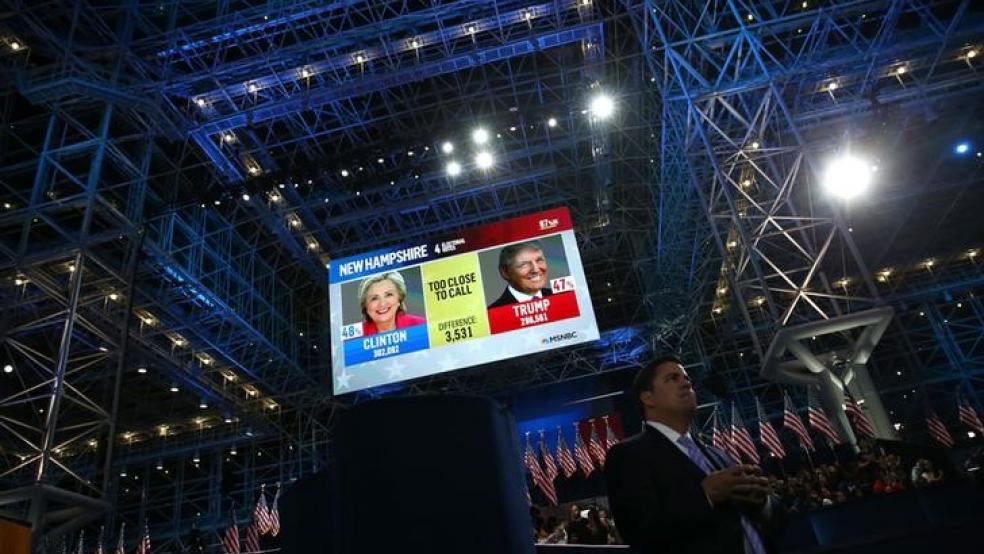Hillary Clinton’s narrow victory in the Kentucky Democratic primary on Tuesday will likely give her campaign team a temporary respite following weeks of defeat at the polls, but the former secretary of state’s victory will do nothing to heal the divisions surfacing within the Democratic Party.
Clinton’s win, by the slimmest of margins of just a few thousand votes, is her only primary victory in the month of May. It also came the same night Sen. Bernie Sanders(I-VT) won Oregon’s primary. The result: Clinton should receive 55 delegates, while Sanders gets a little under 50.
Related: Why the Democratic Convention May See More Fireworks Than the Republican One
While the outcome puts Clinton less than 100 delegates away from winning the 2,383 required to become her party’s standard-bearer, it was basically a wash.
What’s more, Sanders’ victory in Oregon ensures that he will continue to bedevil Clinton until the next Democratic contests in two and a half weeks. The former First Lady will have to juggle fending off the Sanders camp and trying to come up with a game plan to take on presumptive Republican nominee Donald Trump who is free to launch barbs from the sidelines and gobble up media coverage.
Clinton’s task has been made all the more difficult by the sudden toxic turn the Democratic primary race has taken in recent days.
Tensions boiled over at the Nevada Democratic convention over the weekend when frustrated Sanders’ supporters staged rowdy demonstrations, shouting and throwing chairs at the meeting in Las Vegas. Sen. Barbara Boxer (D-CA) was booed off the stage and later said she feared for her safety; the state party’s chair, Roberta Lange, said she has received death threats.
Related: Sanders’ Attacks Are Taking a Serious Toll on Clinton
The actions, resembling some of the more chaotic rallies Trump has held over the last nine months, put top Democrats on edge that such a scene could play out live on television at the party’s convention in Philadelphia this July and told Sanders to get his backers in line.
Sanders did so in a statement, one that devoted more time to taking Democratic Party to task for being hostile to his supporters.
“I condemn any and all forms of violence, including the personal harassment of individuals,” he said in a statement. “If the Democratic Party is to be successful in November, it is imperative that all state parties treat our campaign supporters with fairness and the respect that they have earned.”
The democratic-socialist doubled-down on his critique Tuesday night.
Related: Would Democrats Be Better Off With Sanders vs. Trump?
“The Democratic Party is going to have to make a very, very profound and important decision. It can do the right thing and open its doors and welcome into the party people who are prepared to fight for real economic and social change,” Sanders said during a rally in California. “I come from the working class of this country and I will be damned if we allow the Republican Party, whose job it is to represent the rich and powerful, to win the votes of working-class Americans.”
He also predicted that he’ll win the California primary on June 7.
“Don’t tell Secretary Clinton. She might get nervous. I think we’re going to win here in California,” he said, further suggesting that he will stay in the race until the convention.
The challenge now for Clinton is to turn her attention to the states and territories voting June 5 and 7, where she could add enough delegates to her already healthy stable of super-delegates to become the Democratic nominee, while at the same time finding some way bring Sanders’ supporters into her tent.
It’s possible that she might not have to work that hard at doing so, that the Vermont lawmaker’s base will trickle over to her in fear of a Trump presidency.
Clinton could try to make amends by giving Sanders, who has won 22 contests, a lead role in shaping the party’s platform this summer in an attempt to mollify and then seek to energize her White House bid by replicating the huge, boisterous rallies that have become trademarks of the Sanders and Trump campaigns.
The worst case scenario would be for Clinton to limp into the party convention, and exit with the nomination as bruised as she walked in, with no consensus backing her up heading toward November.





